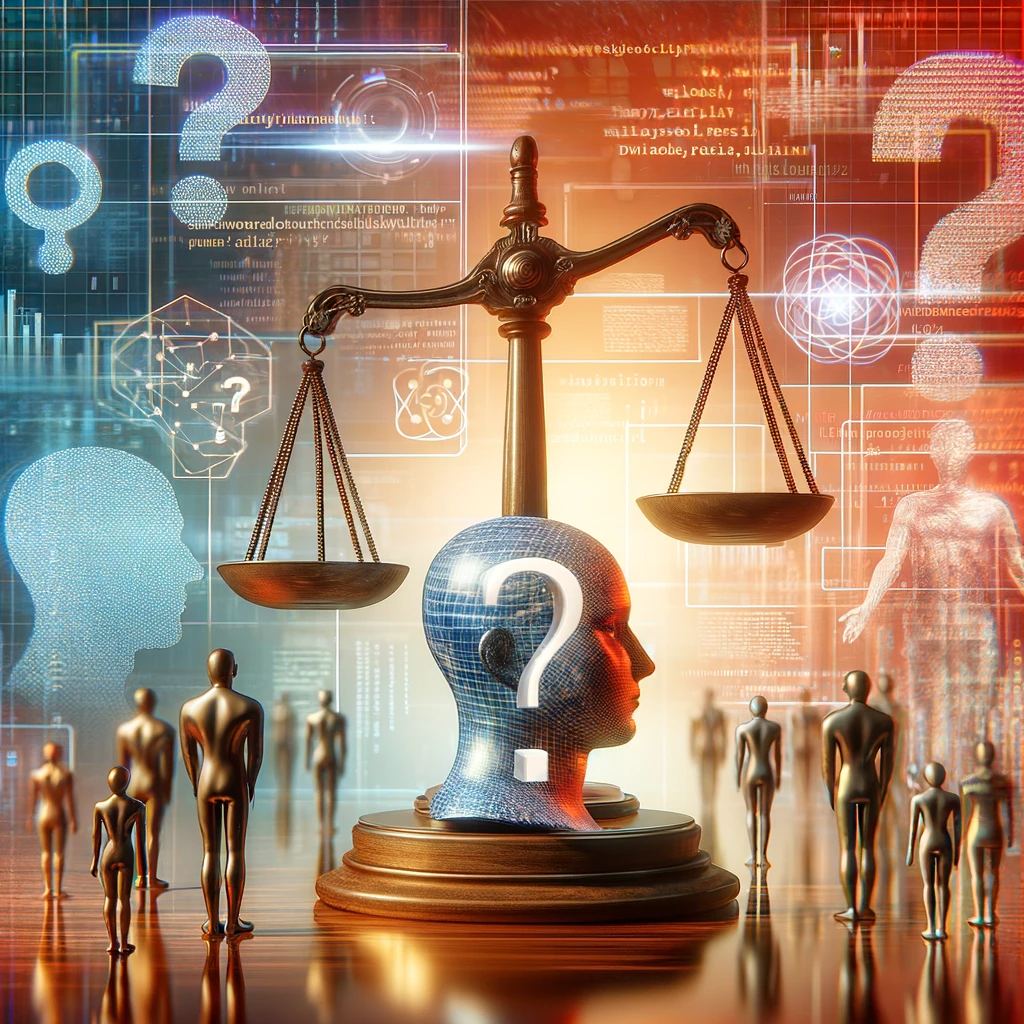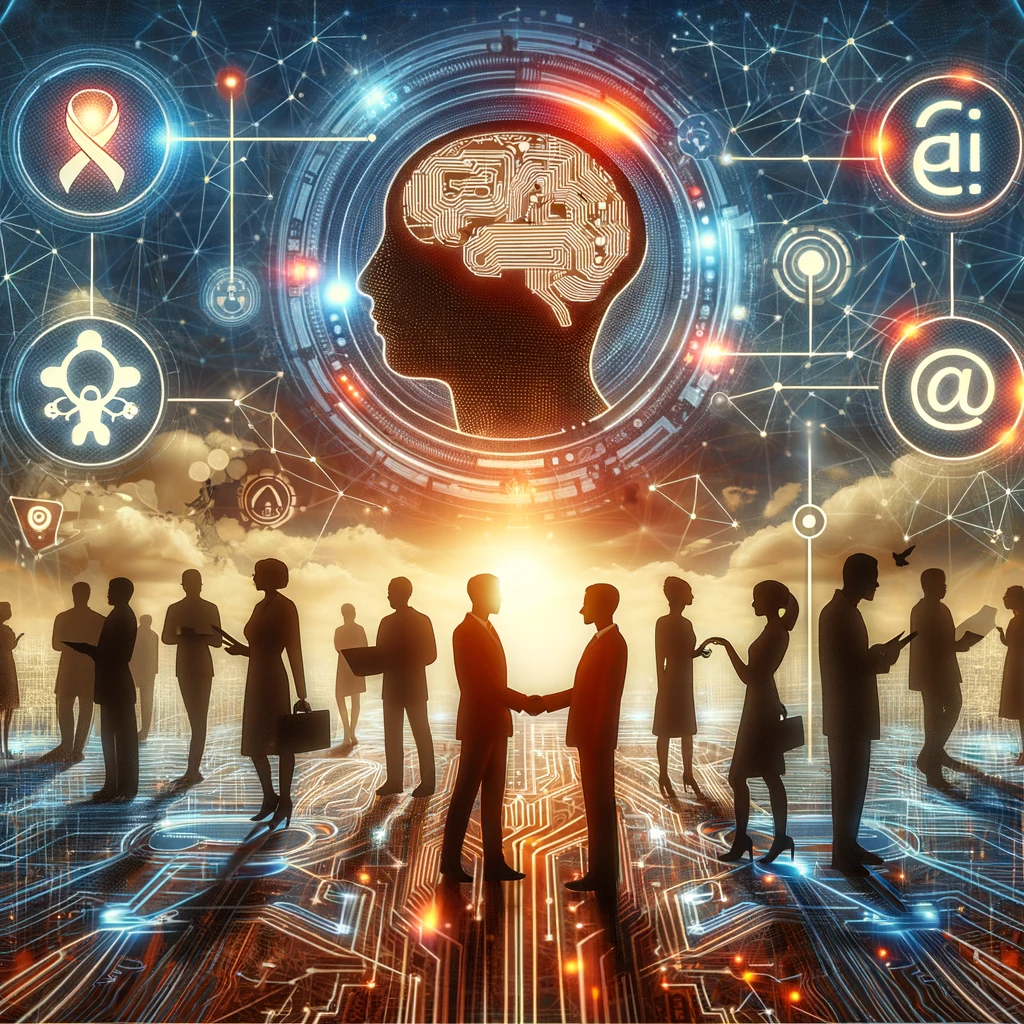In the digital age, we find ourselves surrounded by artificial intelligence (AI) like never before. From the algorithms that curate our social media feeds to the virtual assistants that respond to our every query, AI has seamlessly woven itself into the fabric of our digital existence. It brings undeniable convenience, efficiency, and innovation to our online experiences. Yet, beneath the surface of this technological marvel lies a complex web of ethical considerations that demand our attention.
Welcome to the exploration of the “Ethics of AI in Digital Spaces.” As we navigate the digital landscapes shaped by AI, it becomes increasingly apparent that the integration of this powerful technology is not without its moral dilemmas. This article delves deep into the heart of these ethical considerations, offering insights, perspectives, and solutions to help us navigate the moral maze.
In an era where AI seems omnipresent, our digital interactions have become profoundly personal. AI anticipates our needs, recommends content tailored to our interests, and even makes decisions on our behalf. This remarkable capability raises profound ethical questions about privacy, bias, transparency, and accountability that we cannot afford to ignore.
As we embark on this journey, we will explore the ethical dimensions of AI’s pervasiveness in digital spaces. We will investigate the principles and frameworks that guide ethical AI development and deployment. Along the way, we will confront issues related to privacy, examining how data is collected, used, and protected in the digital realm.
AI’s propensity for bias is another ethical challenge we’ll confront head-on. We’ll delve into the biases ingrained in AI algorithms and their far-reaching implications, especially for marginalized communities. Our exploration will emphasize the importance of fairness, equity, and diversity in AI systems.
Transparency and accountability will also take center stage as we unravel the importance of understanding how AI makes decisions. We’ll discuss the challenges posed by black-box AI algorithms and advocate for the need to make AI more explainable and answerable.
To bring these ethical considerations to life, we will present real-world case studies of organizations and platforms navigating the ethical landscape of AI. These examples will showcase the practical application of ethical AI principles and offer valuable lessons for developers and users alike.
Yet, our exploration does not stop at the challenges. We will also explore the strategies and approaches for mitigating ethical risks in AI and discuss the ethical dilemmas that AI developers and users face. We’ll ponder the trade-offs between AI’s benefits and potential harms and underscore the need for a delicate balance between innovation and ethical responsibility.
As we gaze into the future, we’ll speculate on the evolving ethical discourse surrounding AI. Emerging trends, technologies, and regulations will shape the ethical landscape, and we must be prepared to adapt and engage in responsible AI practices.
In the end, this article invites you to join the conversation about the ethics of AI in digital spaces. It encourages you to consider the profound impact of AI on our digital lives and to advocate for a digital world that upholds the highest ethical standards. The digital spaces we inhabit are as much a reflection of our values and principles as the physical world, and together, we can navigate the moral maze of AI and create a digital environment that we can be proud of.
The Pervasiveness of AI
In an age where digital interactions have become an integral part of our daily lives, it’s impossible to ignore the omnipresence of artificial intelligence (AI). Whether we’re scrolling through social media, making online purchases, or seeking information through search engines, AI algorithms are at work, shaping our digital experiences in profound ways.
Our digital existence is now intertwined with AI in ways we might not even realize. These algorithms analyze our preferences, predict our behavior, and customize content to cater to our individual interests. They power the personalized recommendations that guide our entertainment choices and the chatbots that assist us with customer support inquiries. The ubiquity of AI has ushered in a new era of convenience and efficiency in our digital interactions.
The Need for Ethical Scrutiny
Yet, as AI becomes more deeply integrated into our digital spaces, the need for ethical scrutiny becomes increasingly pressing. The pervasive nature of AI raises fundamental questions about the ethical implications of its widespread adoption. How do we ensure that AI, while enhancing our digital experiences, also upholds the values and principles that we hold dear?
This article embarks on a journey into the “Ethics of AI in Digital Spaces,” where we navigate the moral maze that AI presents. We explore the intricate ethical considerations that arise as AI becomes an ever-present force in our digital lives.
Defining Ethical AI
At the core of our exploration lies the concept of ethical AI. But what exactly does it mean for AI to be ethical? Ethical AI refers to the development and deployment of artificial intelligence systems in a manner that aligns with moral principles, societal values, and established ethical standards.
The Ethical Frameworks
To guide the development of ethical AI, various ethical frameworks and guidelines have been developed. These frameworks offer a set of principles and best practices that aim to ensure AI systems operate in a manner that respects individual rights, promotes fairness, and avoids harm.
Ethical AI, in essence, requires a delicate balance between technological innovation and moral responsibility. It prompts us to consider not only what AI can do but also what it should do, particularly in digital spaces where its influence is most profound
.

Privacy Concerns
One of the foremost ethical considerations surrounding AI in digital spaces pertains to privacy. In our increasingly connected world, personal data has become a valuable currency, and AI relies heavily on the collection and analysis of this data.
Data Collection and Usage
AI algorithms in digital environments often collect a vast array of data, including browsing habits, location information, and personal preferences. This data serves as the lifeblood of AI, enabling it to make personalized recommendations, tailor content, and provide user-specific experiences.
However, this data collection raises significant ethical concerns. Users may be unaware of the extent to which their data is being gathered and utilized. The boundaries between convenience and intrusion become blurred, making it crucial to examine issues related to informed consent and data protection regulations.
Bias and Fairness
AI’s propensity for bias is another pressing ethical concern in digital spaces. While AI systems are designed to make objective decisions based on data, they are not immune to the biases present in the data they are trained on.
The Challenge of Bias
Bias in AI algorithms can manifest in various ways. It may result in discriminatory outcomes, reinforce stereotypes, or unfairly advantage or disadvantage certain groups. For example, AI algorithms used in hiring processes have been found to exhibit gender and racial biases, perpetuating inequality.
Addressing bias in AI is not merely a matter of correcting algorithms but also requires a broader examination of the data sources, human biases, and systemic issues that underlie these technologies. Fairness, equity, and diversity must be central considerations in AI development to ensure ethical practices prevail in digital spaces.
Transparency and Accountability
AI systems in digital spaces often operate as black boxes, making it challenging to understand how they arrive at decisions. This lack of transparency poses ethical challenges, especially when AI impacts individuals’ lives and well-being.
The Importance of Transparency
Transparency in AI refers to the ability to understand and explain how AI systems reach their conclusions or recommendations. It’s crucial not only for users but also for developers, policymakers, and society at large.
However, many AI algorithms, such as deep learning neural networks, can be difficult to interpret. This opacity can lead to distrust and hinder accountability. Ethical AI demands that we find ways to make AI systems more transparent, providing insights into their decision-making processes.
Ethical AI in Practice
While ethical principles provide a framework, putting ethics into practice in AI development is a complex endeavor. In this section, we’ll explore real-world examples of organizations and platforms navigating the ethical landscape of AI.
Case Studies
We’ll present case studies showcasing how businesses and digital platforms have grappled with ethical AI. These examples will highlight practical applications of ethical AI principles, demonstrating the challenges and successes in integrating ethics into digital spaces.
Ethical Dilemmas and Trade-offs
As we delve deeper into the ethics of AI, we encounter a multitude of dilemmas and trade-offs that AI developers and users face. These ethical quandaries require careful consideration and deliberation.
Balancing Innovation and Responsibility
AI promises innovation, efficiency, and convenience, but it also carries potential ethical risks. Ethical dilemmas often revolve around striking the right balance between technological advancement and ethical responsibility. We’ll explore these dilemmas and the difficult choices they entail.
Mitigating Ethical Risks
Addressing ethical challenges in AI goes beyond recognition; it requires strategies and approaches for mitigation. In this section, we’ll discuss practical steps to mitigate ethical risks in AI.
Ongoing Monitoring and Auditing
Continuous monitoring and auditing of AI systems are essential to identify and rectify ethical issues. These practices can help ensure that AI remains aligned with ethical principles throughout its lifecycle.
Interdisciplinary Collaboration
Ethical AI benefits from diverse perspectives and expertise. Collaboration between technologists, ethicists, policymakers, and other stakeholders is vital to navigate complex ethical terrain effectively.
The Future of Ethical AI
The ethical landscape of AI is not static; it evolves alongside technological advancements and societal changes. In this section, we’ll speculate on the future of ethical AI in digital spaces.
Emerging Trends
We’ll explore emerging trends in AI ethics, including developments in technology, regulations, and ethical discourse. Understanding these trends will help us anticipate the ethical challenges and opportunities that lie ahead.
Adapting to Change
As AI and digital spaces continue to evolve, ethical considerations must adapt as well. Ethical AI practitioners and stakeholders will need to remain agile and responsive to ensure that ethical principles remain at the forefront of AI development.

Conclusion
In conclusion, the “Ethics of AI in Digital Spaces” presents a multifaceted and evolving landscape that demands our attention and ethical responsibility. AI’s pervasiveness, coupled with its potential for both positive and negative impact, underscores the urgency of ethical considerations in digital environments.
As we navigate the moral maze of AI, we must prioritize transparency, fairness, accountability, and data privacy. Ethical AI is not a static destination but an ongoing journey that requires continuous reflection, adaptation, and collaboration.
By engaging in thoughtful ethical discussions, advocating for responsible AI practices, and shaping the future of AI in digital spaces, we can contribute to a digital world that reflects our values, respects our rights, and ensures that the benefits of AI are realized without compromising our ethical principles.
In this ever-changing digital landscape, the ethics of AI will remain a crucial compass, guiding us toward a future where technology enriches our lives while respecting our moral compass.
